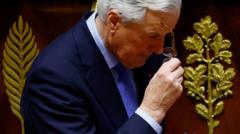In a staggering turn of events, the French government has crumbled following a no-confidence vote against Prime Minister Michel Barnier, who was appointed just three months prior by President Emmanuel Macron. Members of Parliament (MPs) voted overwhelmingly in favor of the motion, marking a critical moment in French politics as it is the first government collapse through a no-confidence vote since 1962.
The opposition had initiated the vote after Barnier controversially employed special powers to push his budget through without parliamentary approval. The absence of a clear majority following the summer's snap elections has led to mounting tensions within the government, with Barnier's budget plan—which included €60 billion in deficit reduction—facing sharp criticism.
Both the far-right National Rally, led by Marine Le Pen, and the left-wing New Popular Front coalition expressed strong opposition to Barnier's inclusion in the government. Le Pen labeled Barnier's budget as "toxic for the French," emphasizing the need for accountability in representation and governance.
After the no-confidence vote, which required 288 votes to pass, a total of 331 MPs supported the motion, forcing Barnier to submit his resignation alongside the defunct budget. In a statement to the National Assembly prior to the vote, Barnier lamented that removing him would not address the financial challenges facing the nation.
Although Macron remains unaffected by the no-confidence vote—which does not impact his presidency, as the two elections are separate—his political future could feel the strain of increasing opposition pressures. With speculation surrounding a new government formation, the French president is expected to address the nation soon amid escalating political tensions.
As Barnier transitions to caretaker status, the parliament is expected to remain in a deadlock until new elections can be organized in July, thereby prolonging uncertainties in France's political landscape.
The opposition had initiated the vote after Barnier controversially employed special powers to push his budget through without parliamentary approval. The absence of a clear majority following the summer's snap elections has led to mounting tensions within the government, with Barnier's budget plan—which included €60 billion in deficit reduction—facing sharp criticism.
Both the far-right National Rally, led by Marine Le Pen, and the left-wing New Popular Front coalition expressed strong opposition to Barnier's inclusion in the government. Le Pen labeled Barnier's budget as "toxic for the French," emphasizing the need for accountability in representation and governance.
After the no-confidence vote, which required 288 votes to pass, a total of 331 MPs supported the motion, forcing Barnier to submit his resignation alongside the defunct budget. In a statement to the National Assembly prior to the vote, Barnier lamented that removing him would not address the financial challenges facing the nation.
Although Macron remains unaffected by the no-confidence vote—which does not impact his presidency, as the two elections are separate—his political future could feel the strain of increasing opposition pressures. With speculation surrounding a new government formation, the French president is expected to address the nation soon amid escalating political tensions.
As Barnier transitions to caretaker status, the parliament is expected to remain in a deadlock until new elections can be organized in July, thereby prolonging uncertainties in France's political landscape.


















